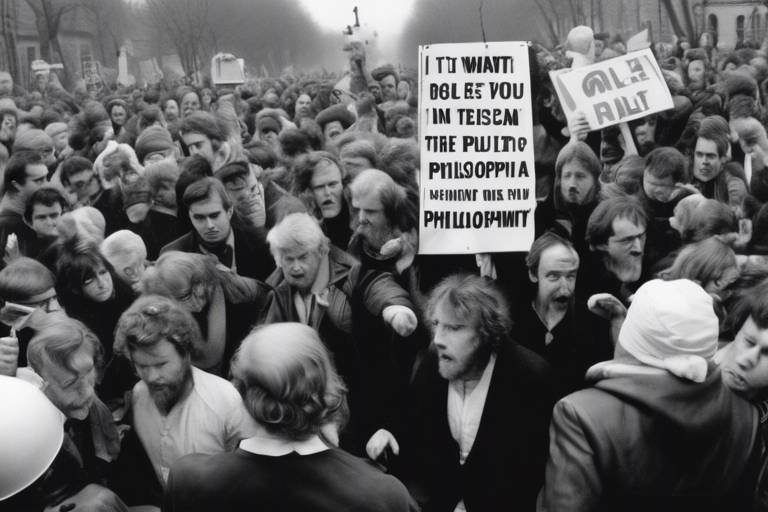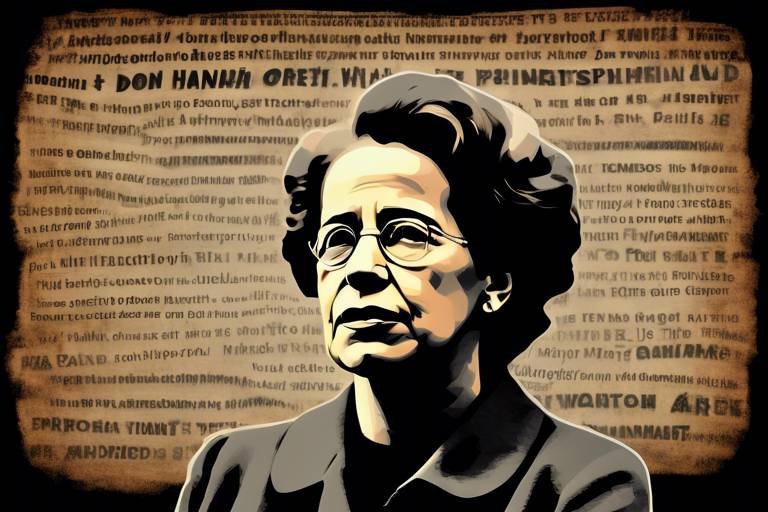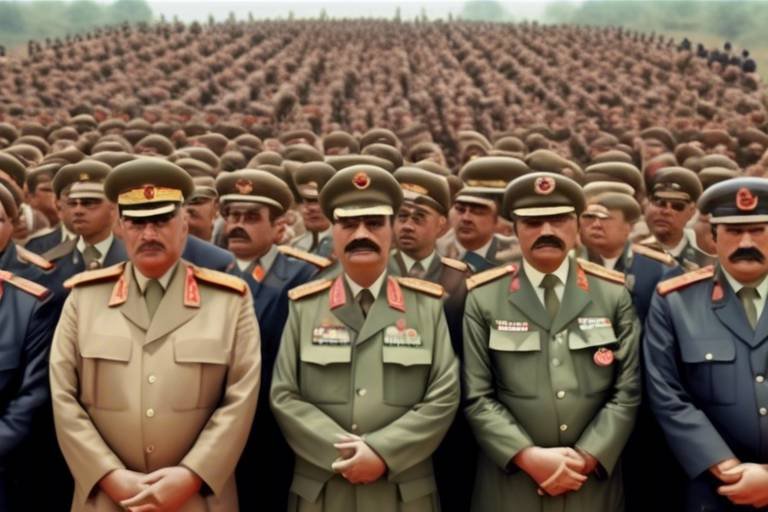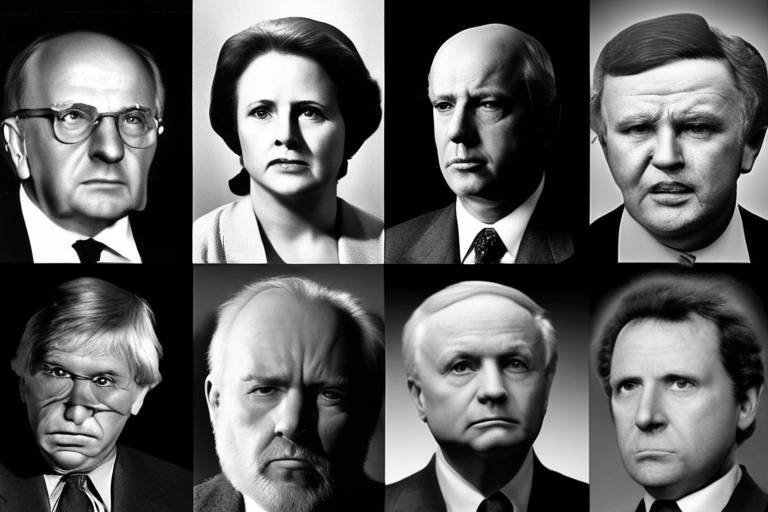The Politics in Karl Popper's Philosophy of Science
When we dive into the intricate world of Karl Popper's philosophy, we find a fascinating interplay between science and politics. Popper, a luminary in the realm of philosophy, was not just concerned with how scientific knowledge is acquired but also how these principles apply to our political landscapes. His thoughts on falsifiability and critical rationalism have profound implications on how we perceive governance and democratic ideals. Imagine a world where political ideologies are subject to the same rigorous testing as scientific theories; that’s the kind of reality Popper envisioned.
In essence, Popper argued that just as scientific theories must be falsifiable to be considered valid, so too should political ideologies be open to critique and revision. This approach encourages a dynamic political environment, where ideas can be challenged, and policies can evolve based on reasoned debate rather than dogmatic adherence. The political implications of Popper's philosophy are significant; they advocate for an open society where democratic principles are not only upheld but celebrated.
Furthermore, Popper's emphasis on critical rationalism promotes a culture of skepticism and inquiry, urging individuals to question the status quo rather than accept it blindly. This is particularly vital in democratic societies, where the ability to engage in critical discourse can lead to better governance and more representative decision-making. By fostering an environment where ideas are rigorously tested, we pave the way for progress and innovation, both in science and politics.
As we explore the various facets of Popper's philosophy, we will uncover how these ideas not only shape scientific discourse but also influence ethical considerations in political decision-making. The connection between science and ethics, a recurring theme in Popper’s work, highlights the responsibilities of both scientists and policymakers in navigating the complex challenges of modern society. In this article, we will delve deeply into these intersections, examining how Popper’s thoughts can guide us toward a more rational and ethical political landscape.
Falsifiability stands as a cornerstone of Popper's philosophy, acting as a litmus test for differentiating between what constitutes a scientific theory and what does not. This principle holds significant implications for political ideologies and decision-making processes. In a world rife with competing narratives, the ability to challenge and potentially disprove a theory is crucial. Just as a scientific claim must withstand rigorous testing, so too must political ideas be subjected to scrutiny.
Consider the political landscape: ideologies that cannot be questioned or tested are akin to scientific theories that lack falsifiability. They risk becoming dogmatic, leading to stagnation and resistance to change. By embracing falsifiability, political systems can cultivate an atmosphere of innovation and adaptability. This is especially important in democratic societies, where the health of the political discourse relies on the ability to question and refine policies continually.
Popper’s vision of an open society is fundamentally tied to his philosophical ideas. He championed the notion that a thriving democracy is built on the foundation of critical discourse. In an open society, individuals are encouraged to express dissenting opinions and engage in debates that challenge prevailing norms. This is not just about tolerating different viewpoints; it's about actively seeking them out to foster a richer understanding of the issues at hand.
The importance of critical discourse cannot be overstated. It serves as a mechanism for accountability, ensuring that those in power remain responsive to the needs and concerns of the populace. In Popper's view, the health of a democracy is measured by its capacity to engage in open dialogue, allowing for the continuous evolution of ideas and policies. This dynamic interplay between science and politics is not merely theoretical; it has practical implications for how we govern and make decisions that impact society at large.
At the heart of Popper's philosophy lies critical rationalism, a framework that encourages skepticism and debate. This philosophy is instrumental in both knowledge acquisition and political discourse. By advocating for a critical approach, Popper challenges individuals to question their beliefs and the beliefs of others, fostering a culture of inquiry that is essential for a functioning democracy.
In political contexts, critical rationalism promotes an environment where policies can be openly discussed, critiqued, and improved. It empowers citizens to engage with their government, demanding transparency and accountability. By applying critical rationalism to politics, we can create a system that is not only more inclusive but also more effective in addressing the complex challenges of our time.
The application of critical rationalism in politics nurtures a culture of questioning and improvement. It emphasizes the importance of evidence-based decision-making, where policies are continually assessed and revised based on their outcomes. This iterative process is vital for ensuring that governance remains responsive to the evolving needs of society.
Popper starkly contrasts critical rationalism with dogmatism, illustrating the dangers of unchallenged beliefs in political systems. Dogmatism can lead to authoritarianism, where dissent is suppressed, and critical thought is stifled. In contrast, critical rationalism champions openness and adaptability, essential qualities for any democratic governance. By embracing these principles, we can cultivate a political environment that is resilient, innovative, and ultimately more just.
Popper's ideas have significantly influenced modern political philosophy, shaping contemporary theories and practices. His commitment to rational discourse and skepticism has inspired a generation of thinkers to reconsider the foundations of political thought. As we navigate the complexities of the modern political landscape, Popper's insights serve as a guiding light, urging us to prioritize reason and evidence in our decision-making processes.
The intersection of science and ethics is another critical aspect of Popper's philosophy. He believed that scientific inquiry is not merely a pursuit of knowledge but also a responsibility that carries ethical implications. As scientific advancements continue to reshape our world, the ethical considerations surrounding these developments become increasingly important.
The advancement of science raises ethical questions that directly impact political landscapes. For instance, consider the role of scientists and policymakers in addressing climate change. Their decisions can have far-reaching consequences, affecting not just the environment but also the lives of millions. Popper's philosophy reminds us that with great power comes great responsibility; scientists must engage with ethical considerations as they contribute to public discourse.
Popper's critique of utopian political ideologies is particularly relevant in today’s context. He argued that striving for an unattainable ideal often leads to disastrous consequences. Instead, he advocated for incremental change, emphasizing the importance of practical, realistic approaches to reform. This skepticism towards utopianism influences political strategies, encouraging leaders to focus on achievable goals rather than grandiose visions that may never materialize.
- What is Karl Popper's main contribution to philosophy?
Popper is best known for his philosophy of science, particularly the concept of falsifiability, which distinguishes scientific theories from non-scientific ones.
- How does Popper's philosophy apply to politics?
His ideas promote critical discourse and skepticism in political contexts, advocating for an open society where policies can be questioned and improved.
- What is critical rationalism?
Critical rationalism is a philosophical approach that emphasizes the importance of questioning and testing beliefs, both in science and politics.
- Why is Popper critical of utopianism?
Popper believes that utopian ideals can lead to authoritarianism and disaster, advocating instead for practical, incremental reforms.

The Role of Falsifiability
Falsifiability is not just a buzzword in the realm of philosophy; it is a powerful tool that Karl Popper introduced to distinguish between scientific theories and non-scientific claims. Imagine trying to find the truth in a chaotic world where opinions clash and facts are often obscured. Falsifiability provides a clear criterion: a theory must be testable and, crucially, able to be proven false. This means that for a theory to hold any weight in the scientific community, there must be a conceivable scenario where it could be disproven. In political ideologies, this concept can serve as a mirror reflecting the robustness of various beliefs and policies.
Consider the implications of this idea in the political arena. When we apply the principle of falsifiability to political ideologies, we can start to see which ideas stand up to scrutiny and which do not. For instance, if a political party promotes a policy that claims to solve unemployment, the policy should be structured in such a way that it can be tested and potentially disproven. If the policy fails to achieve its goals, it should be revised or discarded. This creates a culture of accountability and improvement, rather than one of dogmatism where untested beliefs reign supreme.
In essence, falsifiability fosters a critical approach to decision-making processes in politics. It encourages politicians and policymakers to ask tough questions: "What evidence do we have to support this claim?" or "What would it take to prove this policy wrong?" By embracing this mindset, political discourse can evolve into a more dynamic and adaptive framework. The table below illustrates how falsifiability can transform various political ideologies:
| Political Ideology | Falsifiable Claims | Potential Outcomes |
|---|---|---|
| Socialism | Universal basic income will reduce poverty. | Evidence shows poverty rates decrease. |
| Libertarianism | Less government regulation will boost the economy. | Data shows economic growth or decline. |
| Environmentalism | Renewable energy will reduce carbon emissions. | Measurement of emission levels post-policy implementation. |
By fostering a political culture grounded in falsifiability, we encourage a system where policies are not just accepted on faith but are rigorously tested against reality. This approach can lead to more effective governance and a more informed electorate. In a world rife with misinformation and polarized opinions, embracing falsifiability could be the key to bridging divides and fostering productive dialogue.
Ultimately, Popper's emphasis on falsifiability serves as a reminder that in both science and politics, the ability to question and challenge ideas is essential. It is through this critical lens that we can navigate the complexities of modern governance, ensuring that our political systems remain responsive and accountable to the needs of the people.

When we dive into the realm of democracy and the concept of an open society, Karl Popper's insights become incredibly illuminating. Popper, a philosopher who dedicated much of his work to understanding the dynamics of knowledge and society, believed that a democratic society thrives on the principles of transparency, critical discourse, and the willingness to question established norms. Imagine a garden where ideas bloom freely, and the weeds of dogma are constantly uprooted—this is the essence of an open society according to Popper.
In Popper's view, democracy isn't just a political system; it's a way of life that encourages individuals to engage in dialogue and to challenge ideas openly. He argued that for a society to be genuinely democratic, it must embrace the idea that no ideology is above scrutiny. This is where the concept of falsifiability plays a crucial role. Just as scientific theories must withstand rigorous testing, political ideas should also be subjected to critical examination. By fostering an environment where policies and ideologies can be questioned, we create a more resilient political landscape.
Moreover, Popper emphasized the importance of critical discourse—the notion that discussions should be robust and inclusive, allowing for diverse perspectives. In an open society, every voice matters, and dissent is not merely tolerated but celebrated. This means that citizens are encouraged to express their opinions, challenge the status quo, and engage in debates that can lead to better governance. Think of it as a vibrant marketplace of ideas where the best concepts are traded and refined through rigorous discussion.
However, it’s essential to recognize that Popper was not advocating for chaos or anarchy. Instead, he believed that while ideas should be freely exchanged and critiqued, there should still be a framework of laws and principles that govern society. This balance is crucial; without it, we risk falling into the trap of relativism, where any idea is as valid as another, leading to confusion and instability. A well-functioning democracy requires a commitment to certain universal values, such as human rights and the rule of law, which provide the foundation for a truly open society.
In summary, the intersection of democracy and an open society in Popper's philosophy highlights the necessity of critical engagement and the constant reassessment of our beliefs. It reminds us that a thriving democracy is not a destination but a continuous journey of questioning, learning, and evolving. As we navigate the complexities of modern governance, embracing these principles can lead us toward a more just and equitable society.
- What is the main idea behind Popper's concept of an open society?
Popper's open society emphasizes the importance of critical discourse, where ideas can be freely exchanged and scrutinized. It promotes democracy as a dynamic process of questioning and improving ideas. - How does Popper connect democracy with science?
Popper connects democracy with science through the principle of falsifiability, suggesting that just as scientific theories must be tested and challenged, political ideologies should also be open to scrutiny. - What role does critical discourse play in a democratic society?
Critical discourse is vital for a democratic society as it encourages diverse viewpoints, fosters debate, and helps refine policies and ideas, ensuring that governance is responsive to the needs of its citizens.

Critical rationalism is a fundamental aspect of Karl Popper's philosophy, serving as a bridge between the realms of science and politics. At its core, critical rationalism promotes the idea that knowledge is not an absolute truth but rather a series of hypotheses that can be tested and potentially falsified. This perspective is crucial in political contexts, where rigid ideologies can lead to dogmatism and stagnation. By embracing critical rationalism, individuals and societies can foster an environment of open inquiry, allowing for the evolution of ideas and policies through rigorous debate and skepticism.
In the political arena, critical rationalism encourages leaders and citizens alike to question established norms and practices. It empowers people to challenge the status quo, promoting a culture where ideas are continuously scrutinized. Imagine a vibrant marketplace of ideas, where each theory and policy is a product that must prove its worth to the public. This dynamic not only enhances the quality of political discourse but also ensures that governance remains adaptable and responsive to the needs of society.
Moreover, the implications of critical rationalism extend beyond mere skepticism; they also highlight the importance of dialogue and discourse in a democratic society. By advocating for an open exchange of ideas, Popper's philosophy aligns with the principles of democracy, where diverse viewpoints contribute to a more comprehensive understanding of complex issues. In this sense, critical rationalism can be viewed as a safeguard against the tyranny of the majority, as it emphasizes the need for minority voices to be heard and considered.
To illustrate the impact of critical rationalism in politics, consider the following key points:
- Encouragement of Debate: Political decisions should be subject to rigorous debate, allowing for the exploration of various perspectives.
- Flexibility in Governance: Policies should be adaptable and subject to change based on new evidence and arguments.
- Questioning Authority: Citizens have the right and responsibility to question their leaders and the decisions made on their behalf.
In summary, critical rationalism is not just a philosophical stance; it is a call to action for individuals and societies to engage in thoughtful examination and discussion. By fostering an environment where ideas can be tested and challenged, we can create a political landscape that is not only more democratic but also more effective in addressing the complex issues of our time. In this way, Popper's philosophy serves as a beacon for those seeking to navigate the turbulent waters of political ideology, reminding us that the pursuit of knowledge and truth is a never-ending journey.

When we think about the political implications of critical rationalism, it's essential to recognize how this philosophy shapes the way we engage with governance and policy-making. At its core, critical rationalism encourages a culture of questioning and debate, which is vital for any healthy democracy. Imagine a political landscape where ideas are not just accepted at face value but are rigorously tested and scrutinized. This is the world Popper envisioned—a world where policies are constantly evaluated and improved upon through open discourse.
One of the most significant implications of critical rationalism is its ability to foster an environment where constructive criticism is not only welcomed but celebrated. In such a setting, politicians and policymakers are encouraged to reassess their decisions continually, adapting to new information and changing circumstances. This adaptability is crucial; it allows for policies to evolve rather than stagnate, much like how a river carves its path through the landscape, constantly adjusting to the rocks and bends it encounters.
Furthermore, critical rationalism promotes the idea that no political ideology or policy should be considered infallible. The acknowledgment that all beliefs are potentially fallible opens the door to a more inclusive political discourse. It enables a diversity of perspectives, allowing various voices to contribute to the conversation. In a way, it’s like a potluck dinner: the more diverse the dishes, the richer the experience. This inclusivity is fundamental to democratic practices, as it ensures that minority opinions are heard and considered.
However, the application of critical rationalism in politics also highlights the dangers of dogmatism. When political systems become rigid and unyielding, they risk alienating citizens and stifling innovation. Popper's critique of dogmatism reminds us that clinging to unchallenged beliefs can lead to authoritarianism, where dissent is not tolerated, and critical voices are silenced. Therefore, fostering a culture of critical rationalism is not just beneficial—it is essential for safeguarding democratic values.
In summary, the political implications of critical rationalism are profound. They encourage a dynamic political environment characterized by
- Continuous questioning and reassessment of policies
- Encouragement of diverse perspectives and critical debate
- A strong resistance against dogmatic beliefs and authoritarian tendencies
Q: What is critical rationalism?
A: Critical rationalism is a philosophy developed by Karl Popper that emphasizes the importance of skepticism and the continual questioning of knowledge and beliefs. It argues that all claims should be open to criticism and that no idea should be considered absolutely true.
Q: How does critical rationalism relate to democracy?
A: Critical rationalism supports democratic principles by promoting open discourse, encouraging diverse perspectives, and resisting dogmatic beliefs. This creates an environment where policies can be debated and improved upon, which is vital for a healthy democracy.
Q: Why is questioning policies important?
A: Questioning policies is crucial because it allows for continual improvement and adaptation to new information or changing circumstances. It prevents stagnation and encourages innovation within the political system.
Q: What are the dangers of dogmatism in politics?
A: Dogmatism can lead to authoritarianism, where dissent is not tolerated, and critical voices are silenced. This stifles innovation and can alienate citizens from the political process, undermining democratic values.

In the realm of political philosophy, critical rationalism stands as a beacon of enlightenment, illuminating the path toward open dialogue and inquiry. Karl Popper's philosophy champions the idea that knowledge should be continuously tested and questioned, a stark contrast to the rigidity of dogmatism. Dogmatism, on the other hand, represents a closed mindset where beliefs are held without question, often leading to stagnation and authoritarianism. This section delves into the critical distinctions between these two approaches and their implications for governance and society.
At its core, critical rationalism encourages a culture of skepticism. It prompts individuals to ask questions such as, "Is this belief justifiable?" or "What evidence supports this claim?" This approach fosters an environment where ideas can be freely exchanged and debated. In contrast, dogmatism often results in a refusal to engage with opposing viewpoints, creating an echo chamber that stifles progress. The dangers of dogmatism in political systems are manifold:
- Stifling Innovation: When new ideas are dismissed without consideration, the potential for societal advancement is severely limited.
- Authoritarian Tendencies: Dogmatic beliefs can lead to the justification of oppressive regimes that suppress dissent and critical thought.
- Polarization: A dogmatic approach can deepen divides within society, as individuals become entrenched in their beliefs and less willing to engage in constructive dialogue.
Popper's advocacy for critical rationalism is not merely theoretical; it has practical implications for how societies should be governed. By promoting a framework where policies and ideas can be openly criticized and improved upon, critical rationalism serves as a safeguard against the pitfalls of dogmatism. In a democratic context, this means that policies should be subjected to rigorous scrutiny, allowing for adjustments based on evidence and reasoned debate.
Moreover, the contrast between these two philosophies highlights the importance of openness and adaptability in governance. A government that embraces critical rationalism is more likely to evolve in response to the needs of its citizens, whereas a dogmatic government may cling to outdated ideologies, ultimately leading to disillusionment among the populace. This adaptability is essential in addressing contemporary challenges, such as climate change, social justice, and technological advancements, where rigid thinking can hinder effective solutions.
In summary, the tension between critical rationalism and dogmatism is a vital consideration in the political landscape. By fostering a culture of questioning and open discourse, societies can avoid the pitfalls of authoritarianism and stagnation. As Popper would argue, the pursuit of knowledge is a collaborative effort, and it is through critical engagement that we can hope to build a more just and equitable world.
- What is critical rationalism? Critical rationalism is a philosophical approach that emphasizes the importance of skepticism and the continual testing of ideas to foster knowledge and understanding.
- How does dogmatism affect political systems? Dogmatism can lead to authoritarianism, stifled innovation, and polarization within society, as it discourages open debate and critical engagement with differing viewpoints.
- Why is critical rationalism important in democracy? It promotes an environment where policies can be openly questioned and improved upon, ensuring that governance remains responsive to the needs of citizens.
- Can critical rationalism coexist with dogmatism? While they are fundamentally opposed, elements of dogmatism can sometimes infiltrate systems that are primarily based on critical rationalism, highlighting the need for vigilance in maintaining an open discourse.

Karl Popper's influence on political philosophy is nothing short of revolutionary. His ideas challenge the status quo and encourage us to rethink the very foundations of political theory. By advocating for a philosophy rooted in falsifiability and critical rationalism, Popper has provided a framework that allows political thought to evolve rather than stagnate. This evolution is crucial in a world where political ideologies can often become dogmatic, leading to oppressive regimes and societal turmoil.
One of the most significant impacts of Popper's philosophy is the emphasis on open societies. He posits that a truly democratic society must embrace criticism and allow for the free exchange of ideas. This is not just an abstract notion but a practical guideline for governance. When citizens are encouraged to question and critique their leaders and policies, it fosters a culture of accountability. In contrast, when dissent is suppressed, it can lead to a dangerous environment where unchallenged beliefs take root, often with catastrophic consequences.
Popper's critique of utopianism is another critical aspect of his political philosophy. He argues that striving for a perfect society can lead to totalitarianism, as it often requires the suppression of individual freedoms in the name of the greater good. Instead, he champions incremental change—the idea that societies should aim for gradual improvements rather than radical transformations. This approach not only respects individual rights but also aligns with the scientific method, where hypotheses are tested and refined over time.
To illustrate Popper's impact, consider the following table that summarizes key aspects of his political philosophy:
| Concept | Description |
|---|---|
| Falsifiability | The principle that scientific theories must be testable and refutable. |
| Open Society | A society characterized by democratic governance and critical discourse. |
| Incremental Change | The belief in gradual reforms rather than radical transformations. |
| Critical Rationalism | A philosophy that encourages skepticism and debate in all areas of knowledge. |
In contemporary political discourse, Popper's ideas resonate strongly, especially in discussions surrounding democracy and human rights. His insistence on the importance of questioning authority and the status quo has become a rallying cry for activists around the globe. It serves as a reminder that progress is often born from dissent and that a vibrant democracy requires the active participation of its citizens.
Ultimately, Popper's contributions to political philosophy remind us that while we may strive for ideals, we must remain grounded in reality. By embracing a philosophy that values critical thinking and open dialogue, we not only honor Popper's legacy but also pave the way for a more just and equitable society. His work encourages us to be vigilant, to question, and to demand accountability from those in power, ensuring that the principles of democracy are not just theoretical, but lived experiences.

In the intricate tapestry of society, science and ethics are interwoven threads that significantly influence one another. Karl Popper’s philosophy sheds light on this relationship, emphasizing that scientific inquiry is not merely about discovering facts but also about understanding the ethical implications of those discoveries. As science advances, it brings forth a myriad of ethical questions that demand our attention. For instance, consider the rapid developments in genetic engineering and artificial intelligence. These fields are not only reshaping our understanding of life and intelligence but also challenging our moral compass.
Popper believed that the responsibility of scientists goes beyond the lab; it extends into the realm of societal impact. When scientists make groundbreaking discoveries, they must also engage with the ethical dilemmas that arise. This engagement is crucial because the decisions made today can have profound implications for future generations. For example, the ethical considerations surrounding climate change research are immense. Scientists must navigate the balance between advancing knowledge and advocating for sustainable practices. The consequences of their findings can lead to policies that either protect our planet or exploit it further.
Moreover, Popper's philosophy encourages a critical examination of the ethical frameworks that govern scientific practices. He posited that just as scientific theories are subject to falsification, so too should our ethical standards be open to scrutiny and debate. This leads to a dynamic interplay between science and ethics, where each can inform and refine the other. In this context, it becomes essential for scientists and ethicists to collaborate, ensuring that the pursuit of knowledge does not come at the expense of moral responsibility.
To illustrate this point, let's consider some ethical dilemmas that arise from scientific advancements:
- Genetic Editing: Should we edit the genes of future generations? What are the implications of designer babies?
- Artificial Intelligence: How do we ensure that AI systems are designed ethically and do not perpetuate biases?
- Environmental Science: What ethical obligations do scientists have in communicating the urgency of climate change to policymakers?
These questions highlight the necessity for a robust dialogue that bridges the gap between scientific discovery and ethical considerations. Popper’s insistence on critical rationalism serves as a guiding principle in this dialogue. By promoting a culture of skepticism and inquiry, we can challenge prevailing assumptions and foster a more ethical approach to scientific innovation. This is particularly important in a world where the pace of scientific advancement often outstrips our ability to fully grasp its ethical implications.
In conclusion, the intersection of science and ethics in Popper's philosophy underscores the importance of a collaborative approach to knowledge and morality. As we stand at the crossroads of unprecedented scientific progress, let us remember that with great power comes great responsibility. The ethical implications of our scientific endeavors must be at the forefront of our discussions, guiding our actions as we navigate the complexities of modern society.
- What is the relationship between science and ethics?
Science and ethics are interconnected, as scientific advancements often raise ethical questions that society must address.
- How does Karl Popper’s philosophy influence ethical considerations in science?
Popper's philosophy encourages critical examination and debate of ethical standards, ensuring they evolve alongside scientific discoveries.
- Why is collaboration between scientists and ethicists important?
Collaboration is crucial to ensure that scientific progress is guided by ethical considerations, promoting responsible innovation.

As we navigate the ever-evolving landscape of scientific discovery, the ethical implications of scientific progress become increasingly significant. In a world where technological advancements can change lives overnight, we must grapple with the responsibilities that come with such power. Scientific progress is not just about pushing the boundaries of knowledge; it's also about understanding the impact of that knowledge on society. How do we ensure that our scientific endeavors benefit humanity as a whole, rather than just a select few?
One of the key ethical considerations is the potential for misuse of scientific advancements. History has shown us that innovations can be wielded for both good and ill. For instance, the development of nuclear technology brought about significant advancements in energy production but also posed a grave threat when used for warfare. This duality raises essential questions: Who gets to decide how scientific knowledge is applied? What safeguards are in place to protect society from the unintended consequences of scientific progress?
Furthermore, the relationship between science and ethics is not merely reactive; it is also about proactive engagement. Scientists and policymakers must work together to establish ethical frameworks that guide research and its applications. This collaboration is vital because ethical dilemmas often arise in the wake of new discoveries. For example, the rise of genetic engineering has sparked intense debates about the moral implications of altering life itself. Should we play God, or should we respect the natural order? These debates are not just academic; they have real-world implications that affect policy decisions and public opinion.
To illustrate the complexity of these ethical implications, consider the following table that summarizes key areas where scientific progress intersects with ethical considerations:
| Area of Scientific Progress | Ethical Considerations |
|---|---|
| Genetic Engineering | Manipulation of life forms raises questions about consent and natural rights. |
| Artificial Intelligence | Potential for bias and loss of privacy; who is accountable for AI decisions? |
| Nuclear Technology | Dual-use nature; energy vs. weaponization. |
| Biotechnology | Impact on food supply and biodiversity; ethical treatment of organisms. |
Moreover, the implications of scientific progress extend beyond immediate ethical concerns. They also touch upon broader societal issues, such as equity and access. As new technologies emerge, disparities in access can widen, leading to a situation where only a privileged few benefit from scientific advancements. This situation raises ethical questions about justice and fairness in society. How can we ensure that all members of society have equal access to the benefits of scientific progress? This is where the role of policymakers becomes crucial, as they must create frameworks that promote equitable access to scientific advancements.
In conclusion, the ethical implications of scientific progress are profound and multifaceted. They require ongoing dialogue among scientists, ethicists, policymakers, and the public. As we continue to make strides in our understanding of the universe, we must remain vigilant about the ethical ramifications of our discoveries. After all, science is not just about what we can do; it’s also about what we should do. By fostering a culture of ethical awareness and responsibility, we can ensure that scientific progress serves the greater good and enhances the human experience.
- What are the main ethical concerns related to scientific progress? Ethical concerns include the potential for misuse of technology, equitable access to advancements, and the implications of altering life forms.
- How can scientists ensure their work is ethically sound? By engaging with ethicists, policymakers, and the public to establish ethical frameworks that guide research and its applications.
- Why is public engagement important in scientific ethics? Public engagement fosters transparency and accountability, ensuring that scientific advancements reflect societal values and needs.

Karl Popper was a fierce critic of utopian political ideologies, and his skepticism towards them is deeply rooted in his philosophical approach. He believed that utopianism often leads to authoritarianism, as it promotes a vision of a perfect society that can justify extreme measures to achieve it. In Popper's view, these grand designs for society are not only unrealistic but also dangerous. They tend to ignore the complexities of human nature and the unpredictable nature of social dynamics. Instead of striving for an unattainable ideal, Popper advocated for incremental change, emphasizing the importance of gradual reforms that can be tested and adjusted over time.
Popper’s critique of utopianism can be summarized in a few key points:
- Historical Evidence: Throughout history, many utopian movements have resulted in oppression and violence. Popper pointed to examples like Stalinism and Maoism, where the pursuit of a perfect society led to the suffering of millions.
- Human Fallibility: Popper emphasized that humans are inherently fallible. Therefore, any attempt to create a flawless society is bound to fail, as it overlooks the unpredictable nature of human behavior.
- Focus on Problems: Rather than dreaming of an ideal world, Popper encouraged focusing on solving existing problems. This pragmatic approach allows for meaningful progress without the risks associated with utopian thinking.
By promoting a philosophy of piecemeal social engineering, Popper argued for a more realistic approach to political change. He believed that policies should be continuously evaluated and adjusted based on their outcomes. This perspective not only fosters a culture of critical thinking but also encourages open discussion about the effectiveness of various political strategies. In a way, Popper’s approach is like tending a garden; rather than attempting to create a perfect landscape in one go, a gardener must regularly prune, plant, and adapt to the changing seasons.
Moreover, Popper’s skepticism towards utopianism encourages a discourse that values pluralism and diversity of thought. He argued that a healthy society thrives on debate and dissent, allowing for a multitude of voices and ideas to coexist. This contrasts sharply with utopian ideologies, which often seek to impose a singular vision of the good life on everyone. In Popper’s world, the strength of a democracy lies in its ability to embrace differences and engage in constructive criticism.
In conclusion, Popper's views on utopianism serve as a reminder of the importance of realism in political thought. By rejecting grandiose visions and advocating for gradual, evidence-based reforms, he provides a framework that not only respects human complexity but also promotes a more ethical and adaptable approach to governance.
- What is Karl Popper's main critique of utopianism?
Popper critiques utopianism for its potential to lead to authoritarianism and oppression, arguing that the pursuit of a perfect society often results in the suffering of individuals. - How does Popper suggest we approach political change?
Popper advocates for incremental change, emphasizing the need for gradual reforms that can be tested and adjusted based on their outcomes. - Why is critical thinking important in Popper's philosophy?
Critical thinking is essential in Popper's philosophy because it fosters open discourse, allowing for diverse opinions and continuous evaluation of policies.
Frequently Asked Questions
- What is Karl Popper's philosophy of science?
Karl Popper's philosophy of science is centered around the concept of falsifiability. He argued that for a theory to be considered scientific, it must be testable and potentially refutable. This idea distinguishes scientific theories from non-scientific ones, emphasizing that knowledge is provisional and should be open to scrutiny and revision.
- How does Popper's philosophy relate to politics?
Popper's philosophy has significant implications for politics, particularly in advocating for an open society. He believed that democratic principles thrive in environments where critical discourse and skepticism are encouraged. His ideas promote a political landscape where policies can be debated and improved, rather than accepted dogmatically.
- What is critical rationalism?
Critical rationalism is a key component of Popper's thought, emphasizing the importance of questioning and debating ideas rather than accepting them as absolute truths. This approach fosters a culture of skepticism in politics, allowing for continuous improvement of ideas and policies.
- How does Popper differentiate between critical rationalism and dogmatism?
Popper contrasts critical rationalism with dogmatism by highlighting the dangers of unchallenged beliefs. While critical rationalism encourages open-mindedness and adaptability, dogmatism leads to rigid thinking and stagnation in political systems. Popper advocates for a flexible approach to governance that embraces change and critique.
- What impact has Popper had on modern political philosophy?
Popper's ideas have profoundly influenced contemporary political philosophy by shaping discussions around democracy and governance. His emphasis on falsifiability and critical discourse informs modern political theories, encouraging a more dynamic and responsive approach to political practices.
- How does science relate to ethics in Popper's philosophy?
In Popper's view, there is a crucial connection between science and ethics. He argued that scientific inquiry should inform ethical debates and political decisions, particularly as scientific advancements raise new ethical questions. This relationship underscores the responsibility of scientists and policymakers to consider the societal implications of their work.
- What are the ethical implications of scientific progress according to Popper?
Popper believed that the advancement of science brings forth ethical challenges that must be addressed within the political landscape. Scientists and policymakers share a responsibility to navigate these challenges, ensuring that scientific progress aligns with societal values and ethical standards.
- What is Popper's stance on utopianism?
Popper critiques utopian political ideologies, arguing that they often lead to authoritarianism and failure. Instead, he advocates for incremental change, promoting a pragmatic approach to political reform that focuses on achievable improvements rather than unattainable ideals.



















